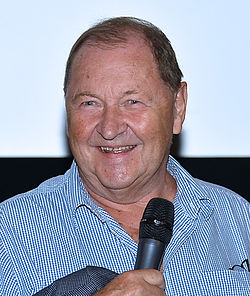1969–1992: Early work
He directed his first feature-length film, A Swedish Love Story (1969). The film, awarded four prizes the same year at the 20th Berlin International Film Festival, looked at the nature and nuance of young love and turned out to be a major critical and popular success for Andersson. Following this success, Andersson fell into a depression. As he didn't want to get stuck with the same style and expectations he cancelled what was going to be his next project, with the script half-way finished, and skipped a couple of other ideas for plots he had previously planned to realize. [4] Eventually he directed the film Giliap which was released in 1975. The film was a financial and critical disaster. After Giliap, Andersson took a 25-year break from film directing, focusing his efforts mainly on his commercial work. [1]
In 1981 he established Studio 24, an independent film company and studio located in central Stockholm. Later, he directed a short-film commissioned by the Swedish National Board of Health and Welfare entitled Something Happened. Made in 1987, the short was meant to be played at schools all over Sweden as an educational film about AIDS, but was cancelled when it was three-quarters complete because of its overly dark nature and controversial use of sources. The official explanation was that it was "too dark in its message," and it wasn't officially shown until 1993. His next short film, 1991's World of Glory , developed this style even further and was a critical success, winning both the Canal Plus Award and the Press Prize at the 1992 Clermont-Ferrand Short Film Festival. The film is on a top ten list of all-time best short films, set by the Clermont-Ferrand festival.
1996–present
In March 1996, Andersson began filming Songs from the Second Floor , a film that was completed four years later in May 2000. After its premiere at the 2000 Cannes Film Festival the film also became an international critical success. It won the Jury Prize in Cannes [5] and five Guldbagge Awards in Sweden for best film, direction, cinematography, screenplay and sound. The film was made up of forty-six long tableaux shots, marrying tough, bleak social criticism with his characteristic absurdist dead-pan and surrealism.
Andersson continued his commercial work at Studio 24 and his next film You, the Living premiered at the 2007 Cannes Film Festival as part of the Un Certain Regard selection. The film won the Nordic Council Film Prize in 2008. The Museum of Modern Art in New York City presented a retrospective of Andersson's work in September 2009.
He expressed his desire to make a new film that could be considered the third part in a trilogy together with his two latest films, and publicly stated that he was planning "a third enormous, deep and fantastic, humorous and tragic, philosophical, Dostoyevsky film." [6] In an interview with Ignatiy Vishnevetsky, Andersson revealed that he would be shooting his next film in high-definition video, possibly using the Red One camera, and that it would represent a departure in style from his previous two films. [7] The film, titled A Pigeon Sat on a Branch Reflecting on Existence [8] was released in 2014 and won the Golden Lion for Best Film in competition at the 71st Venice International Film Festival.
The Museum of Arts and Design in New York City presented a retrospective of Andersson's work entitled It's Hard to Be Human: The Cinema of Roy Andersson in 2015. [9] [10]
In 2019 he released his sixth film About Endlessness which won the Silver Lion at the Venice International Film Festival. Peter Bradshaw of The Guardian praised the film writing, "[The film] is another of Andersson’s superb anthologies of the human condition: people with a zombie-white pallor enclosed in enigmatic tableaux, populating his utterly unique world of unreality and artificiality, scenes of tragicomedy inspired by Tati and Monty Python and created with masterly model work and green-screen effects in the studio. He shows moments of all too human weakness, weariness, gentleness, bewilderment, despair; there are nauseating visions of war crimes, returning us to the genocidal horror he showed in his 1991 short film World of Glory." [11]
